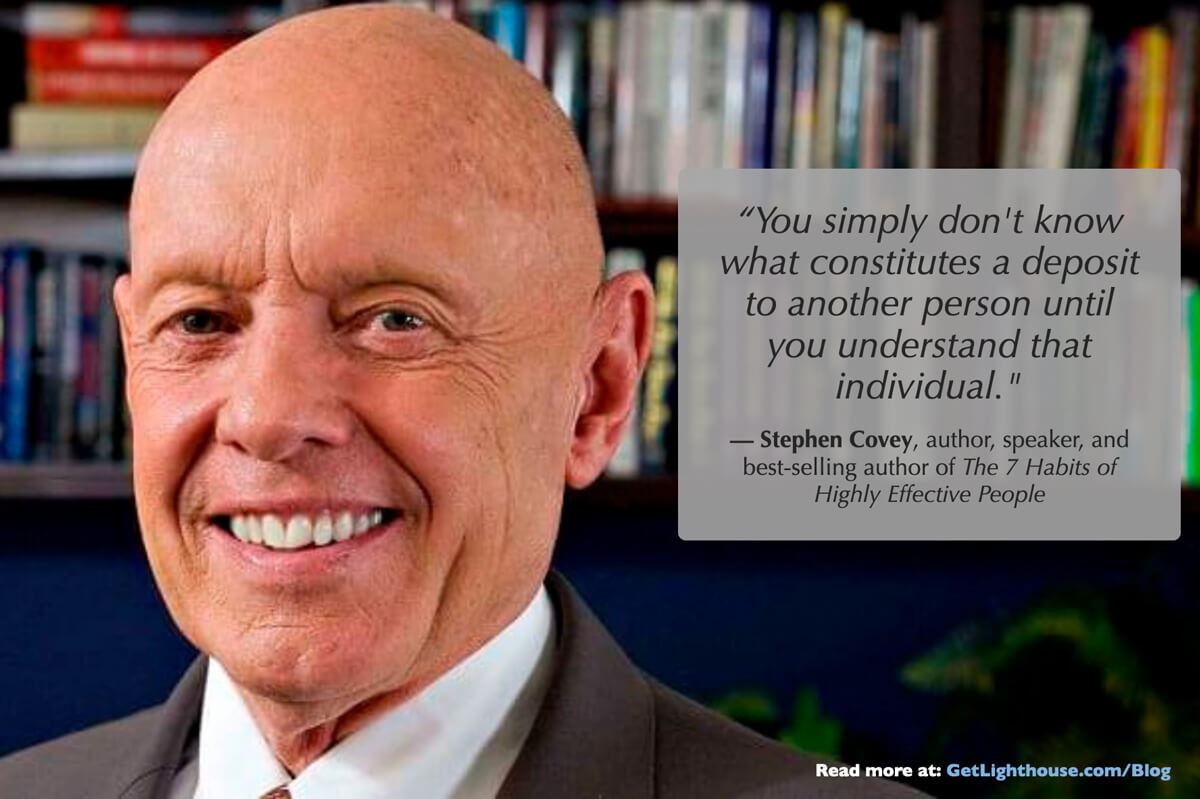Managing people can be hard. Especially if no one showed you how to do it well.
As a manager, you're tasked with guiding, motivating, and coaching your team to succeed. But how can you lead others in those ways? They’re not robots nor a pet where simple orders, or a simple dog treat will get the job done.
This is where Stephen Covey's "emotional bank account" concept comes in. It was first coined in his 1989 leadership classic “The 7 Habits of Highly Effective People”, and remains a vital metaphor for leaders 30+ years later.
The emotional bank account
In his book, Covey explained that you should think of each relationship you have with your team members as a bank account.
You make "deposits" through trust, understanding, and positive interactions with them. Then, you also face "withdrawals" from misunderstandings, difficult decisions, and broken commitments. The balance in each "emotional bank account" determines your ability to influence and lead that person. Without a strong foundation from a positive emotional bank account balance, it's nearly impossible to motivate or lead your reports effectively.
So while Covey suggests you use this concept in your marriage, with your kids, and at work, this principle is particularly important for managers.
You must build up high balances with your team through conscious deposits and consistent, positive habits. Doing so gives you the credibility and trust to lead them to grow and thrive.
Today, we’re going to break down exactly how to apply Covey's emotional bank account as a manager. You'll learn small but powerful ways to understand your people, all the nuances of deposits and withdrawals, and a lot more.
Table of contents:
- What is an Emotional Bank Account?
- How a Manager Can Apply the Principles of the Emotional Bank Account
- Frequently Asked Questions (FAQs) about Emotional Bank Accounts

What is an Emotional Bank Account
To understand the emotional bank account, imagine your relationship with someone is like a financial account. When you make deposits by doing positive, trust-building actions, the balance goes up. Then, you make withdrawals through hurtful or disrespectful behavior, as well as difficult decisions and requests your team doesn’t like, the balance goes down.
This is how Stephen Covey explains this in his book:
"An Emotional Bank Account is a metaphor that describes the amount of trust that's been built up in a relationship. It's the feeling of safeness you have with another human being.
If I make deposits into an Emotional Bank Account with you through courtesy, kindness, honesty, and keeping my commitments to you, I build up a reserve. Your trust toward me becomes higher, and I can call upon that trust many times if I need to.
But if I have a habit of showing discourtesy, disrespect, cutting you off, overreacting, ignoring you, becoming arbitrary, betraying your trust, threatening you, or playing little tin god in your life, eventually my Emotional Bank Account is overdrawn. The trust level gets very low."
The key to all of this is your balance; your team member’s account builds a big, positive balance after many positive deposits, it becomes easier to work with them. They’re more open to your requests and suggestions, while giving less resistance when you need to make a big ask.
On the other hand, when you have more withdrawals that drain the bank account, it becomes much harder to work with those team members. At this point, tension and distrust make every interaction painful.
As a manager, the balance in your emotional bank accounts with each team member determines your ability to lead them. With high balances built on understanding and care, you can motivate and influence them easily, while with low (or negative) balances, your team will resent and resist you.
While we’re focused on work relationships, the emotional bank account concept can also improve personal relationships with family and friends. Consciously making deposits through little acts of care and positivity can transform the most strained relationships over time.
You can see the concept explained from a sales manager’s perspective in this quick video below:
How a Manager Can Apply the Principles of the Emotional Bank Account
Now that you understand the emotional bank account metaphor, the main question is, “How can you apply it to build better relationships with your team?”
Stephen Covey outlines six key "deposits" that leaders can make to create trust and influence with their employees:
- Understand the individual
- Attend to the little things
- Keep commitments
- Clarify expectations
- Show personal integrity
- Apologize sincerely when you make a withdrawal
Practicing these 6 actions requires effort and conscious focus, but the effort is worth it; the deposits will compound over time to allow you to form strong, resilient bonds. Your team members will be more loyal, engaged, and willing to follow you.
Let's explore each emotional bank account deposit type in more detail, along with real-world examples you can use right away as a manager to improve your leadership.
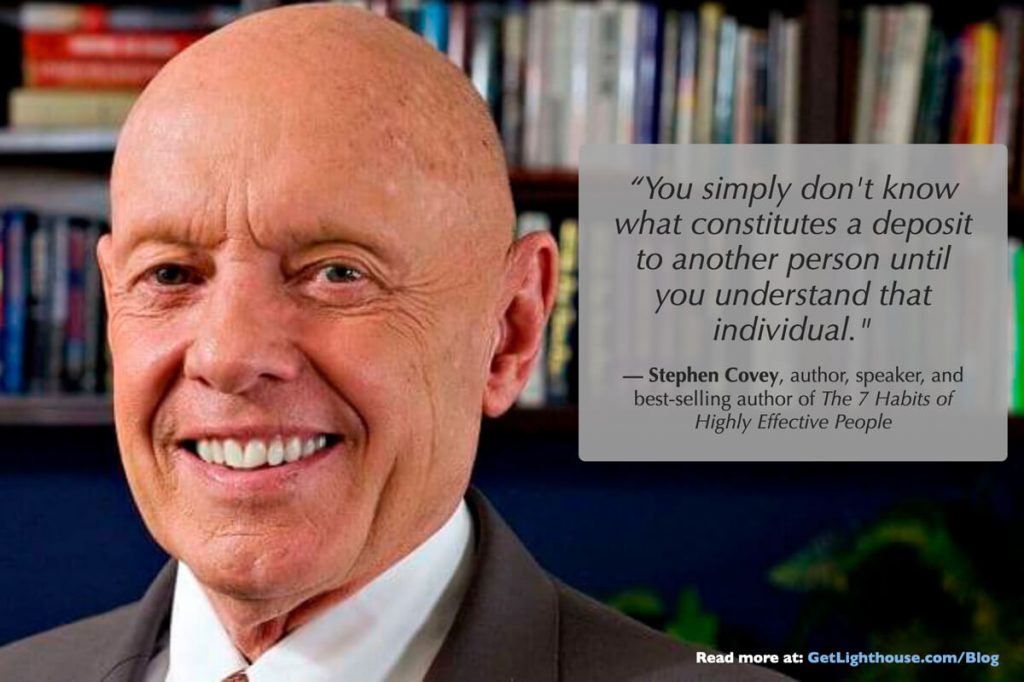
Understand the individual
The first key deposit is taking time to truly understand each person on your team. Get to know what makes them tick as an individual — their unique interests, needs, desires, and motivations.
This is fundamentally about building rapport. As Covey says, "You simply don't know what constitutes a deposit to another person until you understand that individual."
For example, taking a walk and talking may seem like a deposit to you. But to someone more introverted, it could feel like a withdrawal. Your team members all have different communication styles and motivators.
That's why we have in-depth guides on hundreds of ways how to build rapport and an in depth discussion on why building rapport matters, as this is a really good practice to master for many reasons.
Here are some ways you can seek to understand each person on your team, so you can make better emotional bank account deposits:
- Have regular 1:1 meetings focused on their goals and interests, not just work projects. Adapt the meetings to be unique to each person.
- Observe how they like to be recognized or praised. Then tailor your management approach to their needs. Some people love public praise, while others shudder at the thought. Make sure you know the difference before upsetting someone.
- Get to know their background and personality. How did they get here? What excites them outside of work? What are they passionate about? Ask and show interest when you listen.
- Notice their work style. Do they prefer big picture thinking or detailed tasks? Working alone or in groups? Then play to their strengths You may be surprised how often one person’s trash work is another person’s treasure, so assign work accordingly..
- Ask insightful questions to learn about their career and life goals. Everyone is different here, so whether they want to stay on an IC or manager track, or branch into a different role entirely, be the manager that helps them get there.
Making emotional deposits requires tuning in to each individual. Get to know your team on a personal level, and they'll repay you with trust, engagement, and greater effort.

Attend to the little things
Making huge, dramatic gestures can seem impressive. But real emotional deposits often come through small, simple acts of consideration and kindness.
Covey wrote in his book, "Small discourtesies, little unkindnesses, little forms of disrespect make large withdrawals. In relationships, the little things are the big things.”
Here are some everyday ways you can attend to the little things as a manager:
- Make time for a quick check-in chat to show you care. Ask how they’re doing when they look upset.
- Send a handwritten thank you note when someone goes above and beyond.
- Ask how their kids' soccer game went last weekend, or other hobby, passion, or interest they’ve excitedly shared with you in the past.
- Compliment a job well done publicly in a meeting, or privately after, depending on which they prefer.
- Bring a snack, breakfast, or other treat for your team as a surprise when you return from a trip or have a big announcement. Just make sure it fits their interests; donuts would not go over well with a very health-conscious team.
- If they asked you to follow a certain communication practice (ie- “Email me” or “Text me if it’s important”), make sure you follow it when you really need something.
These small deposits add up over time to build trust and goodwill. Just remember that you can think something is a deposit, but it’s actually a withdrawal if you do something that they don’t actually appreciate. That’s why “Understanding the Individual” came first.
Best of all, none of these have to break the bank. Thoughtfulness trumps extravagance when it comes to making emotional deposits.
For more everyday ideas, see our posts on thanking employees and motivating your team:
- How To Thank Your Employees In 5 Simple, Effective Ways
- How To Motivate Your Team Without Breaking The Bank

Keeping Commitments
When you make a commitment or promise as a manager, you must keep it. As Covey wrote, "There's probably not a more massive withdrawal than to make a promise that's important to someone and then not to come through. People tend to build their hopes around promises, particularly promises about their basic livelihood.”
Your team members will resent broken commitments and lose trust in your future promises. If it happens repeatedly, it will destroy your credibility.
And realize that this applies to big commitments like promotions and raises as well as small ones like getting back to someone on a question. Your word is your bond, regardless of size.
To avoid withdrawals and be a consistent leader follow these rules:
- Be extremely careful when making any promise or commitment verbally or in writing. Only commit to what you truly intend to do.
- Set realistic expectations if you’re unsure. It’s better for you to manage expectations and underpromise while overdelivering than to get their hopes up and then disappoint them..
- If circumstances change, explain yourself transparently rather than breaking the commitment quietly. (More on this later)
- Prioritize follow-through. Keep your commitments however you can, and be realistic on not just what you’ll do, but when you’ll do it. If something gets in the way, be honest about the delay and then follow through.
Keeping commitments, no matter how small, make deposits into your teams’ emotional bank accounts. However, the really important lesson is that broken promises and commitments make much larger withdrawals; consistency is key when it comes to your word.
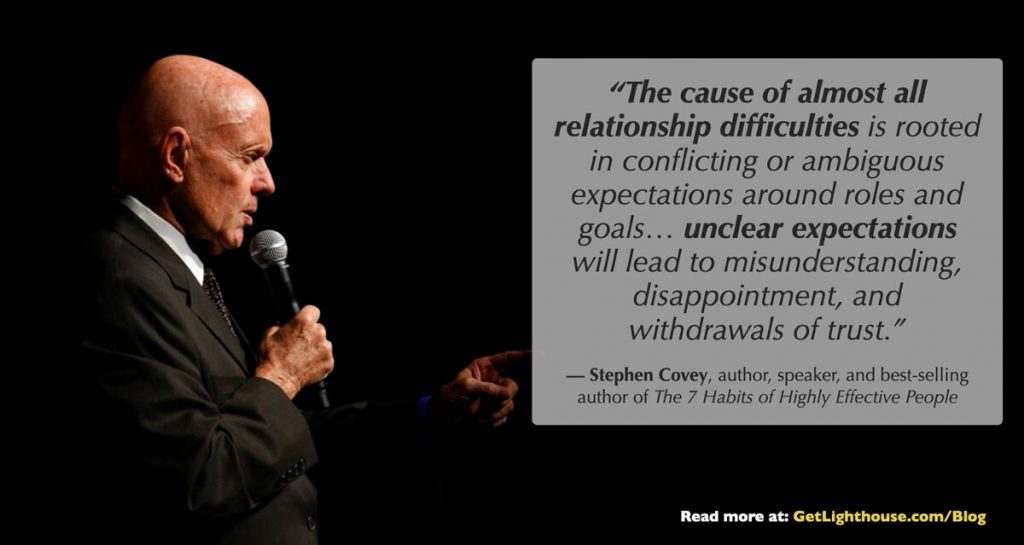
Clarifying Expectations
Imagine driving on an unfamiliar road with no road signs, speed limits, or traffic signals. You'd constantly risk crashing into other cars or going off course.
Leading a team with unclear expectations creates the same chaos.
Stephen Covey highlighted this idea in The 7 Habits of Highly Effective People when he wrote:
“The cause of almost all relationship difficulties is rooted in conflicting or ambiguous expectations around roles and goals…. unclear expectations will lead to misunderstanding, disappointment, and withdrawals of trust”
That’s why, even when it’s hard, we have to lean into the task of creating clarity:
"Clarifying expectations sometimes takes a great deal of courage. It seems easier to act as though differences don't exist and to hope things will work out than it is to face the differences and work together to arrive at a mutually agreeable set of expectations.”
As a manager, work to proactively set clear, mutually agreed-upon expectations to prevent misunderstandings. These may relate to:
- Job responsibilities and priorities
- Performance goals and success metrics
- Work styles and communication preferences
- Project plans and deadlines
- Accountability and standards
It’s a very important part of your job to set clear expectations. If you don’t set them, who will?
Set expectations during 1:1s, team meetings, project launches, reviews, and onboarding. Make sure everyone understands them by leaving time for questions and following up if you think something wasn’t clear.
Creating clarity upfront makes the path forward for you and your team a lot smoother. Fuzzy expectations create confusion and issues down the road that can take huge withdrawals to correct.
When a lack of clarity goes wrong
For example, say you hire someone with expertise you lack. If you try to set expectations with them without a strong base of understanding, you’ll likely miss on estimates, project difficulties, and outcomes. This will be frustrating for them, and put your emotional bank account balance in the negative from the start.
Instead, you’ll want to spend time learning from them to start to fill in your knowledge gaps. Ask questions in earnest, and create a plan in collaboration with them so that you can reasonably hold them accountable for their work.
Remember: you don’t have to have all the answers. You can (and should) create expectations in tandem with your team; they’ll know how hard or easy a task is, have valuable feedback and input, as well as want to ask questions and feel heard.
Make your team part of your expectation setting process to make sure you’re making deposits and not withdrawals.
For more on setting expectations, see our posts on:
- How You Can Get More Feedback From Your Team
- Good Leader Vs. Bad Leader: 6 Key Leadership Scenarios
- How To Improve Your Employee Onboarding Process To Engage Your Hires & Prevent Turnover
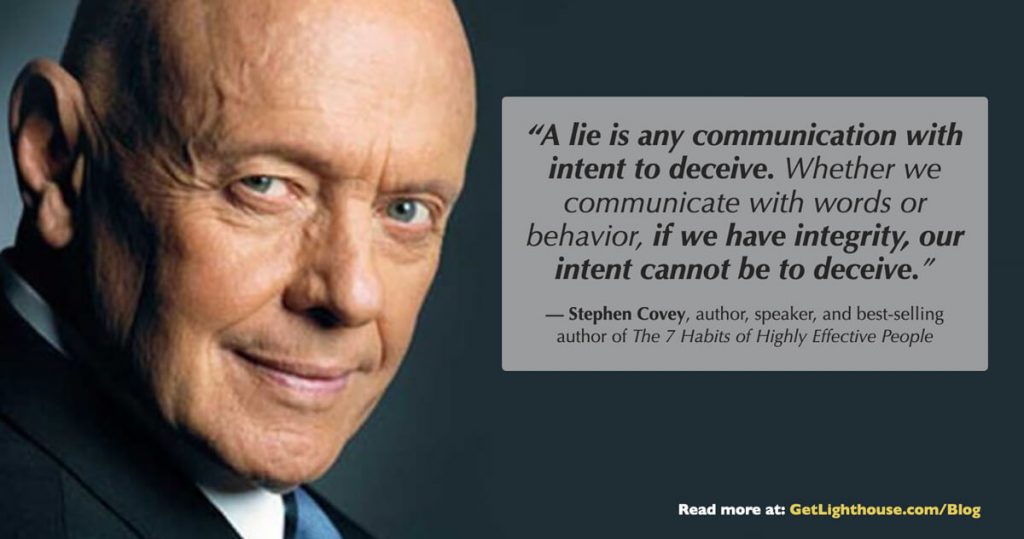
Showing Personal Integrity
Integrity and loyalty make massive deposits into emotional bank accounts. Steven Covey noted that "A lie is any communication with intent to deceive. Whether we communicate with words or behavior, if we have integrity, our intent cannot be to deceive."
So always treat your team in an ethical, principled way:
- Be transparent and honest in your communications to avoid making withdrawals from your emotional bank accounts.
- Make fair, consistent decisions based on clear standards, not your personal preferences.
- Stand up for your team members’ interests when appropriate, not just your own.
- Follow through on promises and commitments with loyalty.
- Hold yourself accountable to the same expectations as your team.
No one likes working for a two-faced manager, nor one that is a “Do as I say, not as I do” type. Duplicity and betrayals will inevitably surface and backfire on you, destroying trust. You simply cannot fake integrity for long.
As a manager, one of the best ways to demonstrate loyalty is by developing your people. This shows that you are invested in them for the long-term.
Learn more about building your team through mentorship in our posts on helping your team achieve goals and promoting from within.
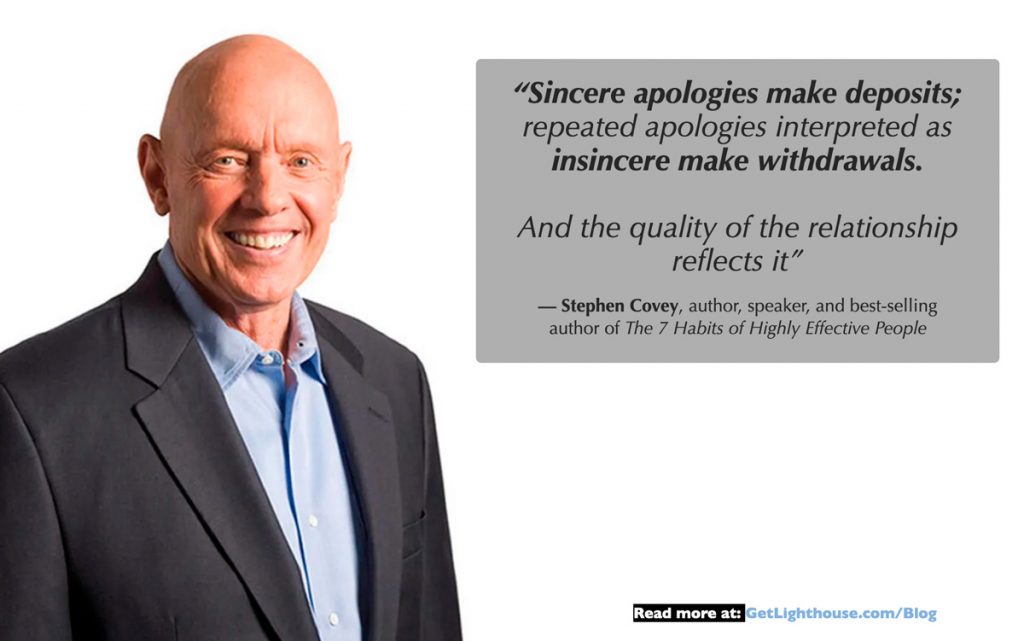
Apologizing Sincerely When You Make a Withdrawal
When mistakes occur and you damage someone's trust, sincere apologies can help you reconcile the relationship. Remember to avoid superficial apologies that focus on your own feelings rather than the impact on the other person. You should apologize fully, not try to deflect and downplay.
While a genuine apology can make a positive deposit to your emotional bank account, insincere apologies will make major withdrawals. A quick, "I'm sorry" or a “I’m sorry you feel that way” instead of a real apology will ring hollow, especially if it happens repeatedly.
According to Covey, great deposits come from sincerely apologies where you say things like:
- "I was wrong."
- "That was unkind of me."
- "I showed you no respect."
- "I gave you no dignity, and I'm deeply sorry."
- "I embarrassed you in front of your friends and I had no call to do that. Even though I wanted to make a point, I never should have done it. I apologize."
He also explained why for many managers it can feel so hard to apologize:
"It takes a great deal of character strength to apologize quickly out of one's heart rather than out of pity.
A person must possess himself and have a deep sense of security in fundamental principles and values in order to genuinely apologize. People with little internal security can't do it. It makes them too vulnerable. They feel it makes them appear soft and weak, and they fear that others will take advantage of their weakness.”
The courage to apologize sincerely displays strength and builds trust, even if it feels scary at first. If you’ve never given a real apology to your team or an individual, you may be worried they’ll jump all over you.
However, the truth is that when you humbly lean into your mistake and work to fix the issues you caused, the general reaction is to be magnanimous and forgiving. It is only when you try to weasel out of responsibility that people react negatively and attack apologies.
The size of the apology should match the size of your mistake.
Just remember to keep it proportionate. You do not need to flog yourself publicly because of a typo, but you should absolutely own up to mistakes and do your part to make it right relative to the size of the mistake.
Here’s a few examples of proportionate apologies:
- If you made a small error in a presentation, own up to the person that it matters to and quickly explain how it won’t happen in the future.
- If you embarrassed a team member who didn’t want to be praised in public, you should tell them face to face (or on video if remote) that you’re sorry you didn’t realize they wouldn’t like it and that you’ll keep praise private to them in the future.
- If you made a major mistake that has hurt the trust of your team, then now it makes sense to more broadly address the issue with your team in a group meeting, and then privately speak with everyone in your 1 on 1 to make sure they feel the situation is fully resolved (or take action on what they suggest as best you can).
For more on re-earning trust after messing up, see our post on how managers can turn around an unhappy team.
Frequently Asked Questions (FAQs) about Emotional Bank Accounts
To help you better understand this concept, let's take a look at some common questions you may have about the emotional bank account concept, and using it at work.
What is the magic ratio for an emotional bank account?
While the emotional bank account metaphor describes balances going up or down, Covey doesn't prescribe an exact formula or ratio to follow. The amounts needed to make withdrawals and deposits likely vary between different relationships.
However, Covey does suggest that in healthy functioning relationships, the balance of deposits should significantly outweigh withdrawals over time.
Some have said that you have to make at least five deposits to get through one withdrawal. However, we suggest you focus less on having a perfect 5:1 ratio and instead focus on consciously making many more deposits than withdrawals. If you consistently make small deposits, then any withdrawals will tend to be covered.
Why is an emotional bank account important?
The emotional bank account is critical because it determines the quality and strength of relationships, whether at home or at work.
When your emotional bank account is full and balances are high, it makes effective communication, motivation, and collaboration a lot easier with your team, friend, spouse, or child. Meanwhile, when balances are low due to repeated withdrawals, your relationships will suffer from tension and resistance.
As author Stephen Covey explained, making regular deposits builds up reserves that leaders can draw upon when challenges inevitably arise and difficult conversations are necessary. The credibility and trust make it easier to steer your team in the right direction.
For managers, high emotional bank account balances with employees enable you to fulfill key responsibilities like providing feedback, delegating, holding people accountable, and influencing priorities. But low balances severely limit your ability to lead and develop your team.
What are common emotional bank account mistakes?
For managers, if you want to have a positive emotional bank account balance with your team, here are the worst 6 mistakes you should avoid:.
- Being disingenuous, fake or phony with your team. They will see through it and trust will be destroyed.
- Treating everyone the same and assuming that a "one size fits all" approach makes deposits for every individual. You need to personalize based on their unique needs.
- Neglecting to make regular meaningful deposits. You can't just make an initial deposit and expect it to sustain the relationship. Consistency compounds.
- Not listening to your team members about what makes them feel valued and building trust. In the end it's their emotional account, so you need their input.
- Allowing withdrawals to significantly outnumber deposits over time. The balance needs to favor positive interactions to weather inevitable mistakes.
- Making commitments you can't keep or giving insincere apologies. Follow through and own mistakes with sincerity to sustain trust
Start Making Deposits to Your Emotional Bank Accounts
Building up strong, positive emotional bank account balances with your team members through consistent deposits may seem like "soft" work. It's far less tangible than hitting sales numbers, shipping products, or other concrete goals.
However, it's foundational to your success as a leader. You cannot effectively motivate or develop people you do not understand, who do not trust you, or with whom you lack integrity and loyalty.
Building a base of strong relationships allows you to guide your team through challenges that arise. Your reserves of goodwill make the difficult conversations and course corrections smoother.
There will inevitably be challenges and problems you will face no matter how good a manager you are today. You cannot predict what economic forces and market conditions will strike your team, or unintended consequences may strike. In those cases, you’ll need your positive balance to help you out.
A story of needing your Emotional Bank Account balances.
My father ran an accounting firm in Pennsylvania. He had a staff of approximately 60 accountants spread out in territories all across the state. A big part of their compensation was commissions based on the work they did and their number of clients.
One year, they ran into some difficult market headwinds. The company also faced some internal struggles that caused the budgets to tighten. My father had no choice but to change commissions, which included cuts for some staff.
Thankfully, my father was a huge proponent of making emotional bank account balances and the principles we’ve talked about today.
In a presentation to staff he practiced many of the recommended approaches:
- He explained the situation transparently to the team, showing integrity and respect for everyone.
- He openly recognized that for some people this would be a pay cut and apologized for any difficulties this may cause some team members.
- He explained how his compensation would also be cut in solidarity with them.
- He committed to not making any additional changes like this for a clear period of time.
- He made clear what needed to happen going forward and how this put the company on more sound footing for the future.
While the room was very tense and many staff were upset, ultimately, the team came around when a long-tenured staff member stood up and said:
“Mike has always treated me fairly over the years. If he says this is what we have to do, then that’s how it’s going to be. I don’t like it either, but we all can see it has to be done, so let’s work together to figure it out.”
By practicing Covey’s tactics, my father was able to navigate a difficult situation and his team was willing to stand by him, even when he was making a major emotional bank account withdrawal.
You never know when a difficult situation may come up for you, so it’s important to practice making regular deposits. That way, when a crisis comes, your team will stand by you, too, and it will be second nature for you to do the right thing.

